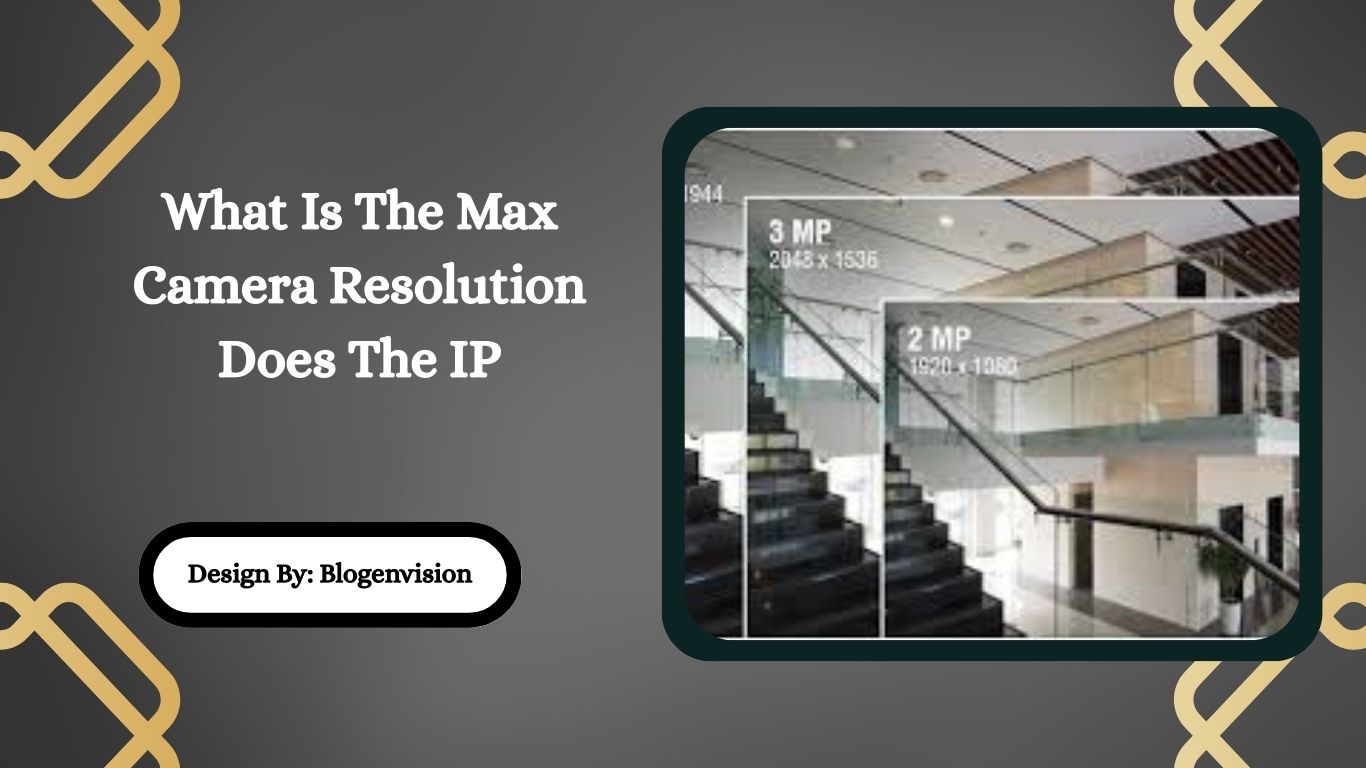What Is The Max Camera Resolution Does The IP – Full Guide!
IP cameras can reach up to 32 MP resolution, offering ultra-clear video. For most users, 2MP to 8MP is ideal. Higher resolution needs better internet, storage, and compatible equipment.
IP (Internet Protocol) cameras are widely used for home security, business surveillance, and large-scale monitoring systems. One of the most common questions buyers ask is about camera resolution how clear the video is and how much detail it can capture.
As camera technology continues to advance, IP cameras now offer resolutions ranging from basic HD to ultra-high megapixel sensors used in professional environments. However, higher resolution isn’t always better for every setup.
What Does “Camera Resolution” Actually Mean?
Camera resolution is the amount of detail the camera can capture in an image. It is measured in pixels (width × height). The higher the number of pixels, the clearer and sharper the video or picture.
For example:
- 1920 x 1080 = Full HD (2MP)
- 3840 × 2160 = 4K Ultra HD (8MP)
More pixels = More detail = Better quality.
List of Common IP Camera Resolutions
Here are the most common resolutions used in IP cameras:
| Resolution | Megapixels | Pixel Size | Quality Level |
| 720p HD | 1MP | 1280 x 720 | Basic |
| 1080p Full HD | 2MP | 1920 x 1080 | Good |
| 1440p / 2K QHD | 4MP | 2560 x 1440 | Very Good |
| 4K Ultra HD | 8MP | 3840 x 2160 | Excellent |
| 12MP Super HD | 4000 x 3000 | Ultra High | Professional |
| 16MP–32MP Ultra HD | Varies | 4608 x 3456 or more | Premium & Industrial |
What Is the Max Resolution for IP Cameras?

The highest camera resolution for IP cameras available today is up to 32 megapixels, but some experimental or industrial cameras may go even higher.
Real Examples:
- Reolink CX410 – 4K (8MP)
- Dahua IPC-HF8835F – 12MP
- Bosch DINION IP Ultra 8000 – 12MP
- Arecont Vision 40MP Cameras – Over 32MP for commercial zones
These are often used in:
- Government buildings
- Banks
- Airports
- Smart cities
- Traffic management systems
Does Higher Resolution Need Faster Internet?
Yes. A higher-resolution IP camera uses more internet bandwidth and video storage. For example:
- 2MP camera: ~2–4 Mbps
- 4K camera: ~8–16 Mbps
- 12MP or more: 20+ Mbps
You’ll also need:
- Faster Wi-Fi
- Larger hard drives
- Cloud storage (if applicable)
Storage Requirements for High-Resolution Video
More resolution means more data. Here’s an estimate for 24-hour recording:
| Camera Resolution | Daily Storage (H.265) |
| 2MP (1080p) | ~15–20 GB |
| 4MP (2K) | ~25–30 GB |
| 8MP (4K) | ~40–50 GB |
| 12MP | ~60–80 GB |
You can save space by:
- Using motion recording only
- Choosing H.265 video compression
- Lowering frame rate
Is High Resolution Needed for Home Use?
Not always. Most home security setups don’t need ultra-high resolution.
For home use:
- 2MP to 4MP is usually enough
- Good for entry doors, garages, and indoor rooms
- Saves bandwidth and storage
For businesses or large properties:
- 8MP or more is better
- Needed for identifying license plates or distant faces
- Best for wide areas like parking lots
IP Camera Types and Resolution Support
Different types of IP cameras offer different resolution options:
Bullet Cameras
- Often 2MP to 8MP
- Best for outdoor use
Dome Cameras
- Common in offices and homes
- Usually 2MP to 4MP
PTZ Cameras (Pan-Tilt-Zoom)
- Range: 2MP to 12MP
- Zoom and rotate features
Fisheye Cameras
- 5MP to 12MP
- 360° wide-angle view
Latest Trends in IP Camera Resolutions (2026)

- AI and 4K: More cameras now come with 4K + AI detection
- Multi-sensor cameras: Combine multiple lenses for wider views and ultra-HD
- Edge storage: Video saved on SD cards inside the camera
- Color night vision: High-res images even in low light
- Cloud AI analysis: Smart systems reduce false alerts even at 8MP+
Tips to Choose the Right IP Camera Resolution
- Start with 2MP if you’re on a budget
- Choose 4MP for a balance of quality and size
- Go for 8MP if you need zoom and detail
- Always check if your NVR/DVR supports high resolution
- Use quality cables and a fast router
FAQs:
1. What is the highest resolution available for IP cameras today?
Modern IP cameras can reach up to 32 megapixels or more, mainly used in industrial, government, and high-security settings where extreme detail and wide coverage are essential.
2. Do all IP cameras support 4K resolution?
No, not all. Only mid-to-high-end IP cameras support 4K. Always check the camera specifications before buying if you specifically need Ultra HD video resolution.
3. Is 2MP enough for home security cameras?
Yes, 2MP (1080p) is usually enough for home use. It provides clear video for identifying people, monitoring entry points, and ensuring basic security coverage affordably.
4. How much internet speed do I need for a 4K IP camera?
You need at least 15–20 Mbps upload speed for smooth 4K streaming per camera. Slower speeds may cause lag or lower-quality video feed.
5. Can I use high-resolution IP cameras with cloud storage?
Yes, but cloud storage with 4K cameras uses more data and may cost more. Look for cloud services that support high-resolution footage and offer compression options.
6. Does camera resolution affect night vision quality?
Not directly. Night vision quality depends more on IR (infrared) technology and sensors. However, higher resolution may provide better detail even in low-light conditions.
7. What happens if I connect a high-resolution camera to a low-end NVR?
If your NVR doesn’t support the camera’s resolution, video might not display, or it could be downscaled, reducing quality. Always match your camera and recorder specs.
8. Are high-resolution IP cameras harder to install or use?
No, installation is similar. However, you may need better cables, faster networks, and stronger processors in your NVR or router for smooth operation and recording.
Conclusion:
IP cameras now offer incredible resolutions up to 32MP, but you don’t always need the highest setting. For homes and small businesses, 2MP to 8MP is often perfect. Higher resolution gives better detail but needs more internet speed, storage space, and compatible equipment. Always balance your needs and budget. With the rise of 4K and smart AI features, IP cameras continue to evolve for both personal and professional use.







